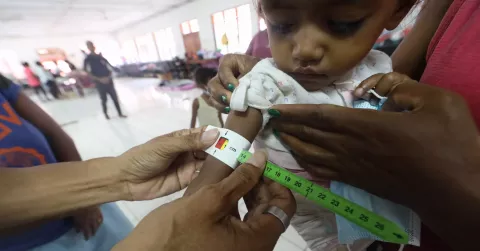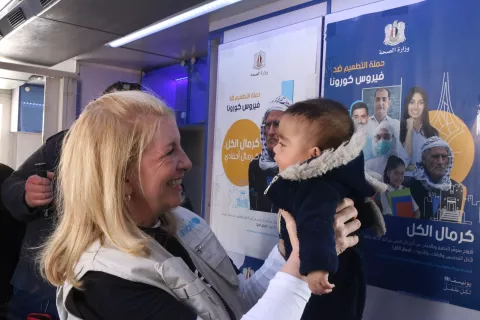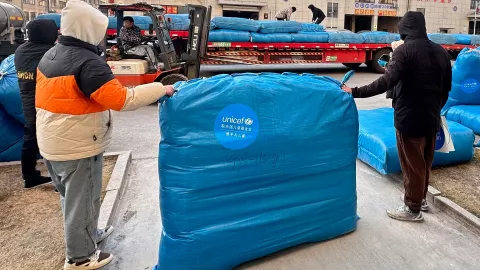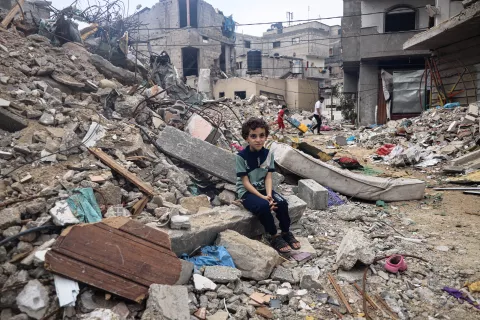Preventing famine and deadly disease outbreaks in Gaza requires faster, safer aid access and more supply routes
Joint press release by WFP/UNICEF/WHO
- Available in:
- 中文
- English
ROME/GENEVA/NEW YORK, 14 January 2023 – As the risk of famine grows, and more people are exposed to deadly disease outbreaks, a fundamental step change in the flow of humanitarian aid into Gaza is urgently needed, United Nations agencies warned today.
The heads of the World Food Programme (WFP), UNICEF and the World Health Organization (WHO) say that getting enough supplies into and across Gaza now depends on: the opening of new entry routes; more trucks being allowed through border checks each day; fewer restrictions on the movement of humanitarian workers; and guarantees of safety for people accessing and distributing aid.
Without the ability to produce or import food, the entire population of Gaza relies on aid to survive. But humanitarian aid alone cannot meet the essential needs of the Gaza people. The United Nations, international aid agencies and non-governmental organizations have so far managed to deliver limited humanitarian assistance in Gaza, despite extraordinarily difficult conditions, but the quantities fall far short of what is needed to prevent a deadly combination of hunger, malnutrition, and disease. The shortage of food, clean water, and medical assistance is particularly severe in the northern areas.
Humanitarian action is seriously limited by the closure of all but two border crossings in the south and the multi-layered vetting process for trucks coming into Gaza. Once inside, efforts to set up service points for people in need are hampered by bombardments and constantly shifting battle fronts, which endanger the lives of ordinary Gazans and the UN and other humanitarian personnel striving to help them.
“People in Gaza risk dying of hunger just miles from trucks filled with food,” said WFP Executive Director Cindy McCain. “Every hour lost puts countless lives at risk. We can keep famine at bay but only if we can deliver sufficient supplies and have safe access to everyone in need, wherever they are.”
The latest Integrated Food Security and Nutrition Phase Classification (IPC) report found devastating levels of food insecurity in Gaza and confirmed that the entire population of Gaza – roughly 2.2 million people – are in crisis or worse levels of acute food insecurity. Virtually all Palestinians in Gaza are skipping meals every day while many adults go hungry so children can eat, and the report warned of famine, if current conditions persist.
WFP has been providing food to people inside Gaza every day since 7 October and reached more than 900,000 people with food assistance in December. This has required pivoting to new ways of operating with local partners, including finding safe sites for distributions, channelling wheat flour into bakeries so that they can resume production, and distributing special food supplements to help children fight off malnutrition. On Thursday, WFP’s first food convoy to North Gaza since the humanitarian pause delivered food supplies for around 8,000 people.
The conflict has also damaged or destroyed essential water, sanitation and health infrastructure and services and limited capacity to treat severe malnutrition and infectious disease outbreaks. With Gaza’s 335,000 children under 5 years of age especially vulnerable, UNICEF projects that, in the next few weeks, child wasting, the most life-threatening form of malnutrition in children, could increase from pre-crisis conditions by nearly 30 per cent, affecting up to 10,000 children.
“Children at high risk of dying from malnutrition and disease desperately need medical treatment, clean water and sanitation services, but the conditions on the ground do not allow us to safely reach children and families in need,” said UNICEF Executive Director Catherine Russell. “Some of the material we desperately need to repair and increase water supply remain restricted from entering Gaza. The lives of children and their families are hanging in the balance. Every minute counts.”
UNICEF has been warning since November that children in southern Gaza are accessing only 1.5 to 2 litres of water per day, well below the recommended requirements for survival. To address this, UNICEF and partners have provided safe drinking water to over 1.3 million people, but much more is needed to address the desperate conditions. UNICEF has also provided medical supplies, including 600,000 doses of vaccine, nutritional supplements and vitamins to children and pregnant women, and humanitarian cash transfers to over 500,000 households.
Since the start of the hostilities, WHO and partners have been supporting the health system in Gaza with deliveries of medical equipment and supplies, medicines, fuel; coordination of emergency medical teams; and disease surveillance. There have been more than a dozen high-risk missions to deliver supplies to hospitals in northern and southern Gaza. WHO and partners helped establish two kitchens at Al-Shifa hospital, now serving 1200 meals a day and delivered medical supplies to support treatment for up to 1,250 children with severe acute malnutrition, and the establishment of therapeutic feeding centres.
“People in Gaza are suffering from a lack of food, water, medicines and adequate healthcare. Famine will make an already terrible situation catastrophic because sick people are more likely to succumb to starvation and starving people are more vulnerable to disease”, said WHO Director-General Dr Tedros Adhanom Ghebreyesus. “We need unimpeded, safe access to deliver aid and a humanitarian ceasefire to prevent further death and suffering.”
Israeli authorization to use a working port close to the Gaza Strip and border crossing points into the north is critically needed by aid agencies. Access to Ashdod port, roughly 40 km to the north, would enable significantly larger quantities of aid to be shipped in and then trucked directly to the badly affected northern regions of Gaza, which few convoys have managed to reach.
“The flow of aid has been a trickle in comparison to a sea of humanitarian needs,” said Phillip Lazzarini, Commissioner General for the UN Palestine Refugee Agency (UNRWA). “Humanitarian aid will not be enough to reverse the worsening hunger among the population. Commercial supplies are a must to allow the markets and private sector to re-open and provide an alternative to food accessibility.”
The agency heads emphasize the urgent need to lift the barriers and restrictions on aid delivery to and within Gaza, and for commercial traffic to resume. They reiterated the call for a humanitarian ceasefire to enable this vitally important roll-out of a massive, multi-agency humanitarian operation.
Media contacts
About UNICEF
UNICEF works in some of the world's toughest places, to reach the world's most disadvantaged children. Across more than 190 countries and territories, we work for every child, everywhere, to build a better world for everyone.
| Visit UNICEF Global website: www.unicef.org Visit UNICEF China website: www.unicef.cn Follow us on Sina Weibo: http://weibo.com/unicefchina Wechat: unicefchina |





